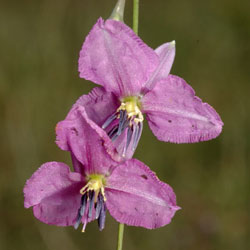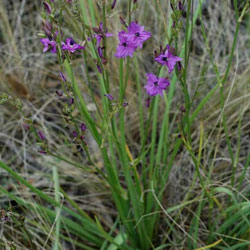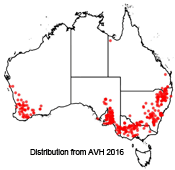Arthropodium fimbriatum
 |
 |
Chocolate Lily
[Synonym: Dichopogon fimbriatus (R.Br.) J.F.Macbr.]Arthropodium fimbriatum is a member of a genus of rhizomatous perennial herbs with tuberous roots, bearing a terminal inflorescence. Widely referred to as the Chocolate Lily due to the strong chocolate fragrance of the flowers, its beautiful purple inflorescence can be found from the beginning of spring through to late summer.
Arthropodium fimbriatum is an erect perennial herb that can reach up to 1m in height. The flowers, typically purple, have fringed petals and are hermaphroditic (contain both male and female parts). Fruits are a pale brown ovule with capsules up to 15 cm long containing numerous black seeds. Leaves are linear up to 8cm long and 2cm wide. Plants have long fibrous roots ending in fusiform tubers. Indigenous peoples have roasted the tubers and eaten them for generations.
Growing in a range of soil types, the species is usually associated with woodland and grassland vegetation types in the south east and south west regions of Australia.
Arthropodium fimbriatum is best germinated from seed under regulated growing conditions until roots develop. The best time to collect seeds is when the capsules are mature, turning a pale straw colour. Either entire spikes or individual capsules can be collected. The seeds can be left to dry within the capsules before breaking them open to dislodge the seeds which should be black when mature. Stratification can be carried out in order to prepare the seeds for germination, involving storing the seed in the fridge for 2 – 4 weeks in order to replicate the natural winter process. Due to their rhizomatous nature, mature plants can be divided. Provided suitable conditions Arthropodium fimbriatum will flower from the beginning of spring until late summer.Itwill not grow in full shade.
Mature plants are generally resilient and are able to survive a range of temperature extremes, fires and grazing. With a minimal amount of care in the early stages of propagation and planting, Arthropodium fimbriatum can effortlessly become a resilient species that can be a delightful addition to any garden.Daniel Cleaver, Volunteer Botanical Training Program Participant 2016
Name meaning: Arthropodium fimbriatumArthropodium - from the Greek 'arthron' meaning a joint and 'podion' meaning a little foot, referring to the jointed pedicels fimbriatum - from the Latin 'fimbriatus' meaning fringed, referring to the fringed margin of the petals |
References:
Fern, K. (1996-12016). Dichopogon fimbriatus - (R.Br.) MacBride.,Plants For A Future. Available at: http://www.pfaf.org/user/Plant.aspx?LatinName=Dichopogon+fimbriatus [Accessed Feb 2016].
Conran, J.G., McCune, S. &. Hardin, D. W. (1993) Dichopogon fimbriatus. Available at http://plantnet.rbgsyd.nsw.gov.au/cgi-bin/NSWfl.pl?page=nswfl&lvl=sp&name=Dichopogon~fimbriatus [Accessed Feb 2016].
![An Australian Government Initiative [logo]](/images/austgovt_brown_90px.gif)


